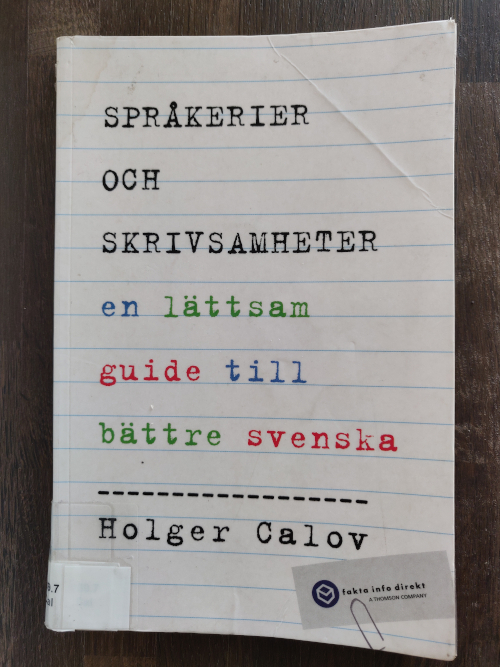Språkerier och skrivsamheter: en lättsam guide till bättre svenska by Holger Calov

A short book of short chapters written in the friendliest tone you can imagine a grammar nazi to have. ‘Grammar nazi’ is even too strong of a term, let’s make it ‘a person who knows a lot about the language and has seen a lot’. The examples of the Swedish language used wrong or at least in a controversial way come from the newspapers, TV, ads, signs, and so on.
Just like “Språket” and “Känsla för svenska”, this book addresses the “He’s taller than jag” vs “He’s taller than mig” question early on. It then proceeds to cover dozens of other questions which might bother native speakers of Swedish.
Random bits and pieces I learned from “Språkerier och skrivsamheter”:
-
att in kommer att might disappear some day, it happened to other verbs
-
it’s not only the learners of the language who struggle with writing compound words together/apart and putting the 's' in the right spot there:
-
first part of the word ending on a vowel → no 's': Örebropolisen
-
first part of the word ending on an 's' or 's'+consonant → no 's': frostvarning
-
when one part is already a compound word, there is 's' in AB+C but no 's' in A+BC: skolbok + hylla = skolbokshylla (shelf of schoolbooks), but skola + bokhylla = skolbokhylla (bookshelf of the school)
-
-
the type of mistake that gets the most attention in the newspapers is an unfortunate splitting of a word when going to the new line, e.g. brott-soffer (something like soffa for crime, not a victim of crime), fabrik-sporten, på-skägg
-
tågstation and tågvagn are relatively new words which get condemned (better use järnvägsstation and alike)
-
among newspapers and magazines, “Forskning & Framsteg” is the one with the fewest language mistakes.
The author ruminated a lot on the influence of English and the internet on the development of Swedish, and explained the fine points of grammar, spelling, and punctuation. There were quite some puns in the book, so language-wise it’s pretty advanced, but I would recommend it to my fellow language learners anyway — it’s important to know which examples from the newspapers you shouldn’t imitate.
★★★★☆
(124 pages, ISBN: 9176102181, Worldcat, Open Library)
There is no comments section, but if you'd like to give feedback or ask questions about this post, please contact me.